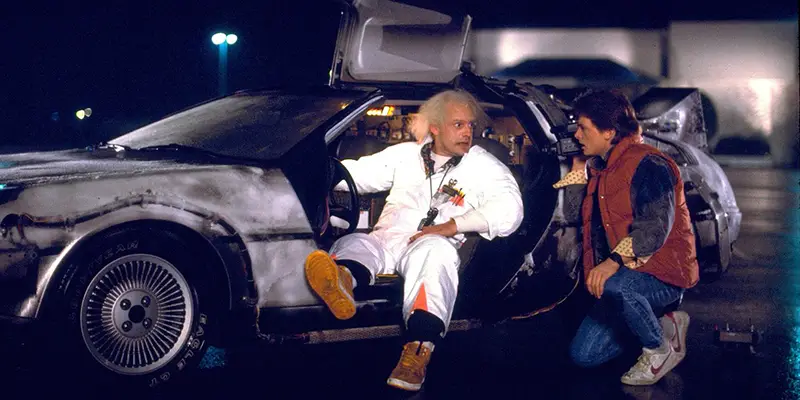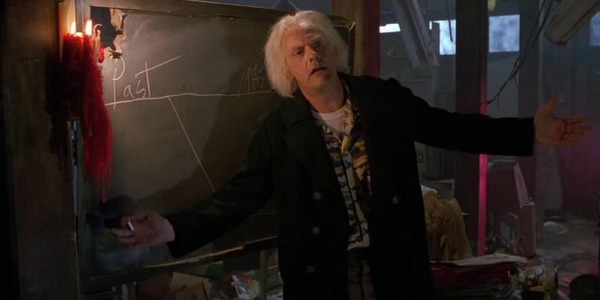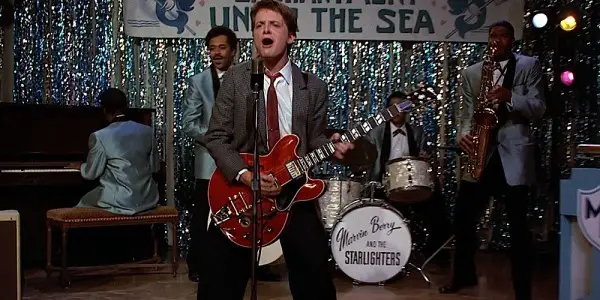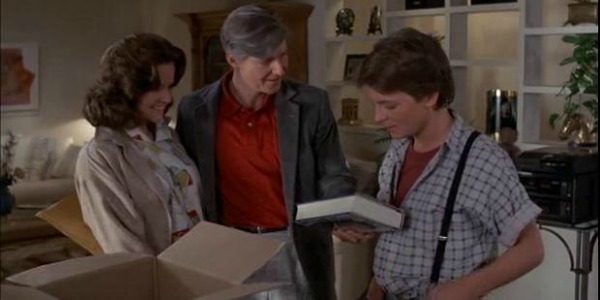Marty’s Paradox: The Creation Of Character In BACK TO THE FUTURE

I love film, more than people probably, and I will…
Paradoxes are not discussed widely in cinema, firstly because they are difficult to understand. Secondly, they simply mess with everyone’s fun. However, they create interesting arguments, and the time travel genre is a great fan of the ‘why not?’ that a paradox can suggest. But before we get going with the film theory, let’s start by discussing what a paradox is. To put it simply: a paradox is something that can’t happen, it is self-contradictory, and it references something that can’t or is not taking place, because its result is dependent on its origin, and vice versa.
The most famous example of a paradox is ‘The Grandfather Paradox’. In this a person would say they are going back in time to kill their grandfather (why? I don’t know, some people don’t like their grandfathers). So say they go back and kill their grandfather, well that nullifies their own existence. But if they don’t exist how could they have possibly been able to kill their grandfather? You get what I’m saying? A paradox is self-contradictory, an impossibility, and the reason why time travel could not exist, in theory.
A perhaps even more famous paradox is the one that occurs in Back To The Future, where Marty McFly spends a week living in one. Marty shouldn’t have been able to do what he did. He went back in time and interfered with his parents’ first meeting, the result of which should have been him completely disappearing from existence (which he doesn’t). More importantly, if his parents didn’t meet, and if they didn’t have him, then how could he go back in time and interfere with their meeting in the first place?
In Back To The Future, the impossibility of the paradox is nudged aside in favour of what is a damn terrific narrative. One which, superbly, philosophises about the ‘what if?’. What if you went back in time? What would happen if you changed things? It’s time travel for beginners, and something I’m sure you’re familiar with. The science and logic of Marty’s creation is intriguing. From paradoxes and the many-world’s interpretation to parental influence and the importance of nurture over nature, Back To The Future is much more than your average time travel movie.
The Science Of The Time Travel Movie
The Back To The Future trilogy and most of the time travel genre do not really acknowledge the paradox, because it is incredibly confusing and doesn’t make for much of a story. Not only because a paradox just can’t happen, but because any such argument also has to acknowledge ‘the butterfly effect’ (referred to as ‘the ripple effect’ by Doc Brown). With this theory, small changes can have huge repercussions (a theory that the film The Butterfly Effect uses with wild abandon), and that just makes things even more complicated and confusing. Thus, science is ditched in favour of the more fun ‘suspension of disbelief’ (the ‘just got with it’ approach). Additionally, audiences don’t really want a science show; they want an escape.
However, the main reason filmmakers don’t like to acknowledge the paradox is that it undoes most narratives, and creates huge plotholes (or fills them in, depending on how you look at it). Take, for example, the electrifying opening sequence of Looper. In theory, Seth’s slow decapitation should have prevented his older self from ever making his escape. But if he didn’t, there would have been no reason to injure the younger Seth. Even if they pieced younger Seth back together, he would have known better than to run again when he returned to the present. However, if you put the paradox theory to one side, this narrative has a pleasing logic to it that makes sense in the realm of the time travel film. I even think it’s worth it in favour of such a brilliant piece of cinema.
Great, although confusing ideas like this permeate the genre, with the The Terminator giving the best example. Kyle Reese is John Connor’s father, but this entire scenario only works if John Connor already exists and sends Kyle Reese back in time to fraternise with his mum, Sarah. But how could John exist if he has yet to send Kyle back in time (already knowing that Kyle is his father and actively encouraging him to fall in love with Sarah)? Again, this has a pleasing logic to it, where the audience is happy to accept the paradox (or ‘loop’) in favour of the romantic narrative.
The problem with paradoxes is that they are self-contradictory. Realistically, they should shut down the action before it’s even begun. They also make the endings to these stories pretty obvious and inevitable. But what kind of time travel movies would we have otherwise? ‘It’s okay everyone, you can go home, the good guy has already saved the day!’ or ‘not to worry everyone! You can pretty much see how this ends’. So, to make it more interesting, what most time travel films actually do is get stuck into the paradox, philosophising, feeling it out, and making its inevitable end seem alterable and indistinct, as you have seen in the above examples. Alternatively, a great many time travel films hang their narratives on the ‘many-worlds interpretation’.

In the many-worlds interpretation, there are many different versions of the past and future, and events can spur new timelines, which run parallel to old ones. Back To The Future II is a great example of this; in fact Doc Brown quite helpfully explains it to the audience. (In subgenres of the time travel movie you can move and back and forth between these worlds, but writers usually like to pick a back and forth or side to side narrative, depending on whether what they favour is sci-fi or actually nostalgia.) The Back To The Future trilogy is hardly unique in the employment of this interpretation, and while more dramatic films like to revel in the inevitability of the paradox (Somewhere In Time), comedy and action like to play around with the idea of what could be as well (Hot Tub Time Machine).
The many-worlds interpretation excuses a lot of the paradoxes that would essentially collapse in on themselves and make time travel, and most film narratives, impossible. It is what much of the Back To The Future trilogy is grounded in, when it suits it. However, while the many-worlds interpretation allows much of what takes place in the trilogy, the fact is that paradox is a much more tempting, dramatic idea. So the trilogy uses the many-worlds interpretation to create a narrative, but then uses paradox to create tension and drama. The pinnacle of this use is seen in the climactic dance scene in Back To The Future.
The Creation Of Marty
So let’s put logic aside and look at what happens in Back To The Future. The minute Marty saves his father from being hit by his own grandfather’s car, Marty should disappear from existence. But since his parents falling in love rests on their kiss at the dance, Marty still stands a chance at bringing them together. The premise of this original film, unlike its two sequels which rest heavily on the many-worlds interpretation, rides on a paradox. It’s a scientific impossibility which, if you ignore it for a moment, has a great deal to say not only about the science of time travel but of the importance of parental influence and the creation of character in children, making it a step above its time travel film peers.
Marty should have never been in the past, before or after he interfered with his parents’ meeting. However, by leaving him to live within this impossibility, Back To The Future creates an original and impressive narrative. Everyone has theorised about whether they would want to connect with their parents, were they not related. It’s a theory on which the ‘two Bobs’ (Gale and Zemeckis) founded the premise of Back To The Future: ‘would you have been friends with your parents if you’d met them in high school?’ With that in mind, Back To The Future plays fast and loose with the logic of time travel to explore something much more human and familiar to all of us: our relationships with our parents.
The culmination of this idea, and indeed the tip of Marty’s paradox rests on his parents’ first kiss. He says it himself: “If there’s no music they can’t dance, if they can’t dance they can’t kiss, if they can’t kiss they can’t fall in love and I’m history”. In this paradox, Marty’s creation hinges on his own confidence to take to the stage and play his guitar. He is ensuring his own procreation and essentially creating himself. But what does this all really say about Marty?

It’s a small thing that the pivotal moment of the Back To The Future story rests on: Marty playing the guitar. It is also hardly a huge ask, as we’ve already seen Marty do the same thing in his audition earlier in the story. However, this isn’t as simple and straightforward as it looks. A lot has gone on in the creation of Marty before this moment occurred, and it is this paradox of Marty’s creation that reveals one of the more interesting ideas of time travel film.
For the entirety of Back To The Future, we see Marty influence his parents, an act that we see improves their lives later on. Therefore, we can also glean that his influence affected how they brought him up, making him the person he is: the good-natured man who could survive going back in time and bringing his parents together. But how did he become this man? Marty wouldn’t be who he is had he not already been born and raised (by earlier versions of George and Lorraine). So seeing as Marty remains the same throughout the story, we have to ask the question: who exactly created Marty?
The self-centered foolishness of the teenage mind means that we inevitably think that Marty is in charge, and he seems to think he is too. After all, getting his parents together is all about his survival, not theirs. We believe he’s simply the guy he is, he made himself, and he can parent George and Lorraine better than they ever could him. It’s in the face of this self-centred idea that we overlook something rather obvious.
Marty could be seen as just being very different to his parents, and you could argue that Doc has played his part in nurturing him, but in these excuses we miss an important fundamental fact. Marty wasn’t raised in a vacuum, and his personality wasn’t just zapped into existence. In fact, it makes more sense that everything that Marty is, everything that he uses to shape his parents, originated in them alone.
George & Lorraine
I think most people who see Back To The Future would side with Marty. His parents are pretty careless, and on the surface it would appear they haven’t done anything positive for Marty. It would seem that he has been left to parent himself, and eventually them too. But is this really the case? Marty’s good nature and confidence must have originally come from somewhere. Whether we use the argument for nature or nuture affecting the development of a child’s personality, it’s logical to point out that while Marty is the hero of Back To The Future, he didn’t get to be this way by accident.
Marty is his parents’ son. He is good-natured like his father, but courageous like his mother. In a way they fit together, so the two sides of Marty’s personality do as well. He deals in risks but always seems to know when to draw the line; he’s a good guy but this can come off as naïve or weak in appearance. He’s the perfect mix of George and Lorraine, a mix which works surprisingly well, as we would all attest to him being pretty awesome. It also works perfectly when he is forced to fix their union, as he is able to influence each parent for the better. He can use the courage he inherited from his mum to inspire his dad, and he can use his father’s kindness to put his mum on the straight and narrow.

What about the argument for nuture? Marty’s parents haven’t exactly done right by him. Or have they? Marty hasn’t turned out too badly. You can say a lot about George and Lorraine, but they’re not bad parents. Sure, George can be inattentive and Lorraine can be grumpy, but they didn’t mess up Marty as much as you’d think. He knows the difference between right and wrong, he wants his Dad to stand up to Biff, and he wants his mum to quit drinking. And in his own self-centered teenagery way he is a good guy who cares about the people around him.
For the purposes of drama, George and Lorraine are sidelined in Back To The Future in order to make way for Marty the hero. But if it weren’t for them, there would be no Marty. He may have saved the day, but they laid the groundwork. Not only that but Marty had an added bonus, something that inspires all time travel plots: knowledge of the past. Sure, Marty fixed things, and accidentally made things better, but he built that on the lessons he had learned from his parents. This makes George and Lorraine not just damn important in the creation of Marty, but pretty much central to what makes Back To The Future such a great film.
Conclusion
You could argue that this is just a movie, and looking into it this far is just too much. However, you can’t ignore one inalienable truth: we inherit everything from our parents. But what we do with it is up to us. Back To The Future is an incredible film, for all its action, adventure and heart. But it’s more than that; it’s an inquiry into what makes you a person.
Marty’s paradox is confusing, I’ll give you that. Firstly, because it just couldn’t happen. Secondly, because if we use the many-worlds interpretation, Marty wouldn’t have faded out of existence if his parents didn’t get together. Theoretically, it would have been as if he were from a parallel dimension. But even with all of that, Back To The Future makes a lot of sense. Marty is the perfect combination of two people who, at the root of them, are perfect foils for one another. By going back in time and passing on to each the lessons he learnt from the other, he made them better versions of themselves.
While Marty may have done the leg work in Back To The Future, George and Lorraine gave him the instructions, which was a plan to survive and improve upon the life they had already given him. George and Lorraine made Marty, but then Marty also made George and Lorraine, who made Marty, who made George and Lorraine. There’s also the possibility that Doc influenced Marty, who in turn influenced Doc and his own parents, who in turn influenced him. But now we’re just going around in circles. Paradoxes, eh? Confusing stuff.
Paradoxes abound in time travel film, sometimes creating the most entertaining and thought-provoking scenarios. What are your favourite time travel films or moments?
Does content like this matter to you?
Become a Member and support film journalism. Unlock access to all of Film Inquiry`s great articles. Join a community of like-minded readers who are passionate about cinema - get access to our private members Network, give back to independent filmmakers, and more.
I love film, more than people probably, and I will watch pretty much anything. Seriously, anything! I have a postgraduate education in film & have spent an exceptionally long time trying to get inside the film industry. I'm a big believer in treating every film the same, and bringing something new to the film theory table, giving reasons for every argument made. You'll find that I'm an empathetic and fun sort of reviewer, at least, I like to think so. If I'm not watching films I'm doing exceptionally nerdy stuff, like watching documentaries about the history of medicine and collecting photos of old post boxes.












